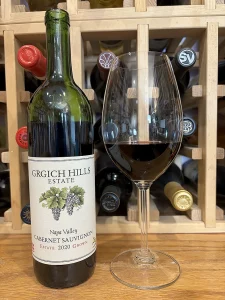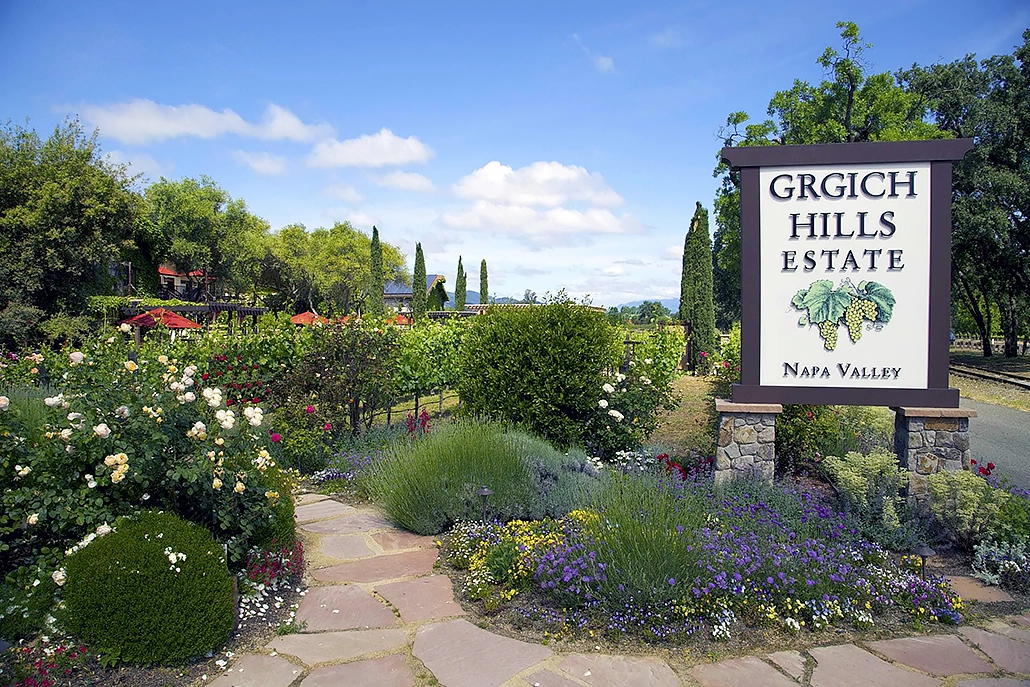Deep ruby color; blackberry, plum, blackcurrant, cherry, black olive, violet, dried herb on the nose and palate.

Dry; dusty, amiable tannins; good acidity (3.65 pH; 5.5 g/L). Blend of 83% cabernet sauvignon, 11% merlot, 5% petit verdot, 1% cabernet franc, primarily from the estate’s Yountville vineyard (cabernet sauvignon) with help from its Rutherford and Calistoga properties. The 2020 growing season was very challenging with multiple heat waves, significant drought, and the added stress of Covid 19. Grgich Hills demonstrated the resilience of certified regenerative organic sustainable farming. Vines produced fewer leaves to conserve water, lowered yields, produced smaller berries. That all means the quantity of fruit was significantly off, but the quality remained. Fermented four weeks with indigenous yeast and skin contact. Classic left bank Bordeaux in style. 14.1% ABV
Grgich Hills Estate began on July 4, 1977 as a partnership between famed winemaker Miljenko “Mike” Grgich and Austin Hills, a member of the Hills Brothers Coffee family, and Hill’s sister Mary Lee Strebl. They deliberately chose Independence Day to symbolically reflect a revolution in American winemaking. The winery’s original sign employed red, white, and blue colors. The name reflects the partnership, with the Hills portion referencing the two owners, not geography.

Austin Hills brought premium vineyards in Rutherford and his business skills to the partnership. Mike Grgich brought exceptional reputation as a winemaker. The year before, Grgich’s Château Montelena Chardonnay shocked the wine world at the Judgment of Paris. Born in a small village on Croatia’s Dalmatian coast and educated at the University of Zagreb, he left Communist Yugoslavia in 1954. He worked in Germany and Canada, her arrived in Napa Valley in 1958. He worked at Souverain, Christian Brothers, Beaulieu Vineyard where he worked with André Tchelistcheff, Robert Mondavi, and Château Montelena. Grgich passed away in 2023 at age 100.


While the winery began with Hill’s Rutherford property, it has since grown to five vineyards across distinct Napa Valley regions: the original Rutherford, Yountville, Los Carneros, American Canyon, and Calistoga. This allows them to source all their grapes from estate properties, prompting a name change from Grgich Hills Cellar to Grgich Hills Estate in 2006. At the same time, the vineyard became certified organic. They also embraced biodynamic farming and installed enough solar panels to meet their electric needs. In 2023, they achieved Regenerative Organic Certification, sequestering some 6.5 tons of carbon per acre.


Mike Grgich retired as president of the operation in 2018 at age 94. His daughter Violet took his place. Today, both the Grgich and Hills families continue to share ownership of the winery equally. Austin Hills remains involved. Mike’s nephew, Ivo Jeramaz, is winemaker and vice president of vineyards & production. Ivo’s daughter, Maja Jeramaz, manages export and California chains, selling Grgich Hills wine around the world.

Grgich Hills Estate Cabernet Sauvignon, Napa Valley 2020 is elegant triumph in a testing year in Napa. Soaring temperatures and plunging rainfall amounts required vines and winemakers to struggle and adapt. Grgich Hills, with their long commitment to organic and regenerative farming, had positioned their vineyards to meet the challenges. Rich red and black fruits, bright, savory, classic cab-led Bordeaux blend. Pairing—beef, of course, grilled or seared ribeye, New York strip, sirloin; beef tenderloin with herb crust; rack of lamb with rosemary, lamb chops, roasted leg of lamb. Venison, roasted duck, grilled chorizo, flavorful sausages. Mushroom risotto, eggplant parmesan, smoked tofu dishes. Cheese—aged cheddar, aged gouda, gruyère, comté, Pleasant Ridge Reserve (Wisconsin alpine-style cheese). Avoid young, soft goat cheese; creamy, soft-ripened cheeses; parmigiano-reggiano; most blue cheeses. $65-72
